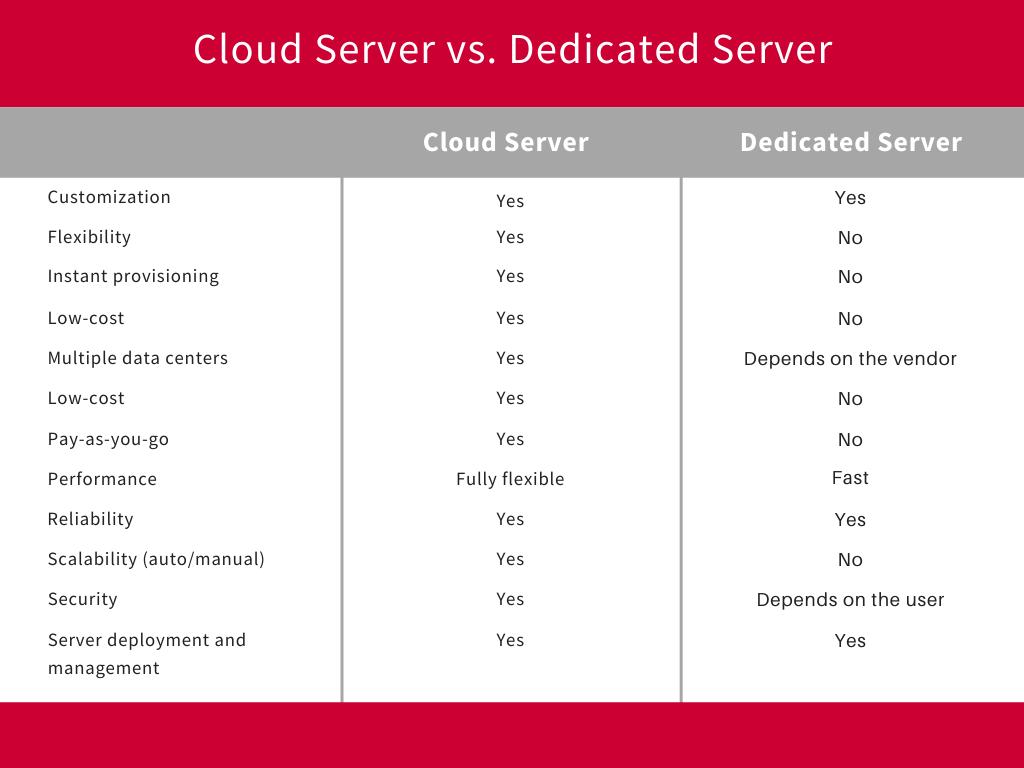Cloud server vs. dedicated server: what’s the difference?
These days, every company across industries has either gone through digital transformation, is in the middle of the process, or has started thinking about it. But before taking the leap, one must consider several factors ahead of making the big decision.
When we talk about modernizing aging IT infrastructure, there will be a lot of factors to go through by making comparisons and asking questions. For example, you might ask questions like “cloud server vs. dedicated server, what’s the best option?”
There’s no one-size-fits-all type of approach. You’ll have to consider the pros and cons of each method and ascertain what’s best for your business.
But before we get ahead of ourselves, let’s define these terms and briefly explore their advantages and disadvantages.
What is a cloud server?
At its most basic, a cloud server (or cloud-based server) is a virtual server that’s hosting data following cloud computing principles. So personal and enterprise data will be stored securely in a data center within the same country or somewhere at the other end of the planet.
Cloud servers are often deployed on cutting-edge hardware and leverage virtualization to run several virtual computers. This means that a cloud server can be configured and deployed within a few minutes.
Cloud servers are also quite similar to Virtual Private Server (VPS) hosting, but the key difference is that the latter relies on a specific physical server. Cloud-based servers can run on multiple servers, and virtual resources can be shared by several computers that work together to form the cloud (or a large virtual network).
As a result, cloud servers can offer limitless resources while VPS comes with its limitations. This means that cloud hosting is better suited for businesses.
Key advantages of cloud servers are as follows:
- Advanced security
- Flexibility
- High availability
- Highly cost-effective
- On-demand resources
- Scalability
What is a dedicated server?
When you host your enterprise technology infrastructure on a dedicated server, it means that the whole server belongs to you (whether it’s purchased or rented). It’s the perfect solution for websites that generate a significant amount of traffic (that will demand a lot of resources).
Often, dedicated servers are only used by large corporations with online marketplaces, popular e-commerce websites, and social networks. This is because it’s built to cope with unlimited traffic, but it’s certainly not a cheap option.
Key advantages of cloud servers are as follows:
- Administrative autonomy
- Advanced security
- Optimal performance
What are the differences?

In the current threat landscape, security is paramount to the success of any business. That’s why at Artmotion, we take the following steps to ensure robust security when our clients move up to the cloud:
- We place each client on a private and dedicated VLAN (to separate the cloud servers)
- Isolate traffic at a network level by leveraging firewalls
- We encrypt data at a storage level to ensure that bad actors can never read the data living in the cloud
- We also encourage our clients to use their own encryption tools and leverage two-factor authentication to add an extra layer of security (and minimize human error)
While cloud servers will grow in popularity and be at the heart of digitally transformed industries, dedicated servers will continue to play a role (but at a smaller scale).
Cloud computing benefits such as flexibility, scalability, security, and affordability are hard to ignore and will continue to drive adoption across industries.
If you’re wondering if you should go for a cloud server or a dedicated server, we can help. Reach out to one of our in-house experts for a free no-commitment consultation.